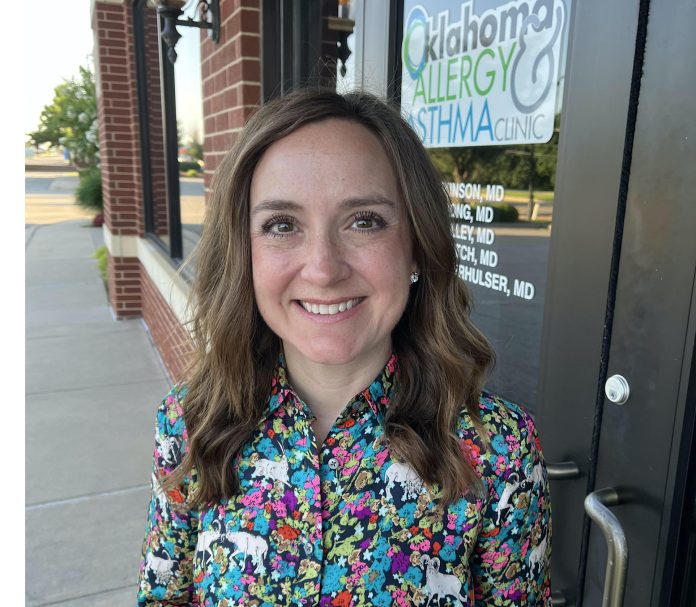
story and photo by James Coburn, Staff Writer
Elisa Thompson gets at the root of what causes problems for patients with allergies and asthma. Thompson is a nurse practitioner at the Oklahoma Allergy & Asthma Clinic, located in Edmond. She also sees patients at the Oklahoma City clinic location.
“I grew up with asthma and allergies. And so, I understand the misery of my patients,” Thompson said. “But what was attractive to me about this specialty is that it is one of few specialties that offers a shot at disease modification.”
A lot of medicine involves treating symptoms. Allergy treatment involves immunotherapy which impacts allergic disease such as asthma and quality of life. This long-standing impact allows patients to cut down on their medications and invigorate their lifestyles with what they choose to do. (story continues below)
The last couple of months of wet weather has been a difficult season for allergies. Pollen from grass, weeds and trees mix with mold levels resulting from damp surfaces.
“We’ve had some days with some pretty significant levels in all categories and it certainly impacts people from a symptomatic standpoint — eyes, ears, nose, throat, lungs, and sometimes even skin, especially those patients with eczema or broken-down skin barrier,” she said.
Having a varied level of nursing experience brings to the table a different level of nursing expertise in patient care. In 2005 she earned her Bachelor of Science in Nursing degree at the Fran and Earl Ziegler College of Nursing at the University of Oklahoma. Additionally, Thompson earned her nurse practitioner degree at the University of Missouri-Kansas City in 2012. Her career as a registered nurse began in a surgical intensive care unit where she fell in love with critical care medicine.
“It was very thought provoking and definitely encouraged me to use critical thinking,” Thompson said. “It also really fostered independence which I loved. I felt very prepared for my role as an RN. I liked the fact that I was fully able to utilize my skills.”
She expanded her horizon by working in the ER, and the PACU before accepting the role of a critical care float nurse for the hospital. She would staff units when needed but would also respond to Code Blue emergencies.
“During that time frame I realized I really wanted to continue my learning journey and become even more independent in my role as a nurse,” she said.
Asthma does not always begin as an allergy, being that there is allergic and non-allergic asthma. But most of Thompson’s asthma patients live with allergic asthma. Allergies manifest in the body and put forth an allergic cascade that begins impacting the lungs as asthma. Non-allergic asthma is treated similarly in terms of conventional care with inhalers and oral medication. Biologic therapy is medication delivered by a shot.
Metropolitan areas with increased population density have a higher prevalence of asthma because of air pollution and negative environmental factors are magnified, Thompson said.
It’s also been found that excrement from mice and cockroaches, dust, and mold in old buildings can make asthma more problematic to control.
Thompson said many of her patients have significant allergies accompanied by auto-immune diseases.
It’s common for children to get many viruses. Thompson has worked in general pediatrics. Seventy-five percent of her visits involved children with viruses. A virus works its way out over time while medicine helps keep a child comfortable.
“But if that runny nose is accompanied by an itchy nose, sneezing, itchy watery eyes, itchy throat, that can be more of a sign of allergies — especially the pattern of it — if they go outside or go around an animal,” she said. “That’s always good to pay attention to.”
Antihistamines are very effective for allergies. There are also prescription medications to treat symptoms.
“I think nasal sprays are highly effective and are greatly under-utilized,” Thompson said.
Her experiences as a registered nurse and a nurse practitioner have been an avenue of love. Thompson loves people and working with them. Being a nurse practitioner allows Thompson to be more of a team with her patients, she said. They think through critical issues together about what’s best for individual care. Thompson takes a personalized approach to patient care.
“I don’t give everyone the same regiment. Everyone has different needs. We’re all built differently,” she said.
Being a nurse practitioner is more than conducting a series of tasks, Thompson continued. “As a nurse practitioner it’s more of a conversation. It’s more of a long-term relationship and follow-up.”
She builds these patient relationships overtime and the outcome for her is rewarding.
Thompson lives life to the fullest by spending time with her husband and kids. She has a vegetable garden that she harvests
“I do jujitsu martial arts. It’s a good way to get some energy out and challenge my brain.”
For more information about the Oklahoma Allergy & Asthma Clinic, visit https://oklahomaallergy.com/about/join-our-team/












